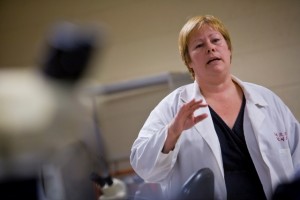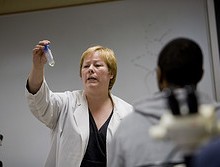
Professor Elaine Reynolds
Elaine Reynolds is known as the Flywoman on campus, a reference that applies to her winged subjects of choice for student research experiments.
But it could just as well pertain to the appearance of perpetual motion this biology professor exudes both in and out of the classroom.
Reynolds, who recently shaved her head to raise money for pediatric cancer and is riding in New York’s Five Boro Bike tour in May for the same cause, is a passionate neuroscientist who has the distinction of working with more than 70 Lafayette students over the past 14 years on projects ranging from the genetics of alcoholism and epilepsy, to computer modeling of neurocomplexity, and how decisions are made at the cellular level — research that has applications in artificial intelligence and cancer prevention.
“I could teach at a lot of other places, but there are very few where I can interact with students as much as I do here,” says Reynolds, currently president-elect of the organization, Faculty for Undergraduate Neuroscience or “FUN.”
Because of similarities in the genes and the cells that make up the nervous system in humans and fruit flies, these insects are used regularly by Reynolds and her students in their quest for new knowledge.
Currently, she has eight students conducting research. One group is looking at genetic factors that could cause alcoholism by conducting experiments that compare how long it takes for normal flies and flies with mutations to pass out when exposed to alcohol.
“Alcoholism is genetic and passed from generation to generation,” she says. “They’re looking for changes in the genome that would predispose someone to the disease.”
One of her other students is studying why some cells become a neuron and others a skin cell during development, while another is using epileptic flies to try and understand why a high-fat diet reduces the incidence of seizures in some people. Pinpointing the responsible compound or mechanism could help people whose epilepsy doesn’t respond to existing medication.
 “There’s potential for development of a new drug,” Reynolds says. How’s that for real world?
“There’s potential for development of a new drug,” Reynolds says. How’s that for real world?
Outside the fly lab and as a professor in an interdisciplinary field, Reynolds frequently collaborates with other faculty to teach courses that mix in art, religion, and philosophy with neuroscience.
“It allows me to think about my field in a different way,” she says, as results of those interdisciplinary pairings are always interesting and often revelatory.
In a First-Year Seminar, she tackled fear not only in a biological sense, but how it’s portrayed in horror flicks as a cultural reflection, and used to influence public opinion by politicians and the media. For example, the class discusses Michael Moore’s Bowling for Columbine to examine how he manipulates the viewer’s opinion on gun control.
“Once you understand how primal the emotion of fear is, it is easier to understand how difficult anxiety or phobia can be to treat or how fear can be used to sway your ideas.”
A native of Pittsburgh, Reynolds knew at an early age that she wanted to be a scientist and majored in microbiology at Penn State University. She returned to her hometown for a Ph.D. in biological sciences from Carnegie Mellon and then received several postdoctoral fellowships at Stanford, State University of New York at Buffalo, and the University of California, Berkley.
She joined Lafayette in 1997, and it’s been a good fit for this fly professor.
“Getting to work with students and collaborate with faculty from other disciplines is just a blast,” she says.

